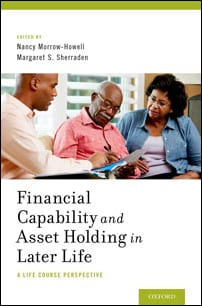Many of the 40 million older adults in the United States are struggling financially. They lack the assets to see them through their later years, when they require more health care and other services than they expected. 
The new book “Financial Capability and Asset Holding in Later Life: A Life Course Perspective” concludes that older adults require financial knowledge and access to financial services in order to build secure lives. The book uses a life course perspective to explain how financial vulnerability is created across many decades and then revealed in old age, when few opportunities exist to reverse difficult conditions.
Published Dec. 29 by Oxford University Press, the book speaks to a variety of professionals, policymakers and others interested in the financial health and security of vulnerable older populations. It offers important insights for ongoing public discussions about entitlement reform, the cost and effectiveness of public benefits, the aging of the population (particularly the baby boom generation), the effect of market volatility on retirement savings, and the growing efforts by corporate and public employers to eliminate pension obligations.
Editors Nancy Morrow-Howell, PhD, and Margaret S. Sherraden, PhD, have assembled contributions from leading experts, who present the latest evidence on financial capability and asset holding among older adults. The book, in three parts, explores financial capability and assets among older adults; the financial vulnerability of diverse racial and ethnic groups, people with disabilities, and immigrants; and current policies, programs and innovations, including working and caregiving in later life, and an assessment of “age-friendly” banking products, services and policies.
The book’s recommendations to improve financial circumstances of people in later life can be summarized in four categories: “build capacity at the individual and household level, create more effective institutions, design better public policies, and advance knowledge through research.”
Morrow-Howell is the Bettie Bofinger Brown Distinguished Professor of Social Policy in the Brown School of Social Work at Washington University, director of the Harvey A. Friedman Center for Aging, and faculty director of Productive Aging research at Washington University’s Center for Social Development.
Contributors include Jacqueline L. Angel, Amanda Barusch, William R. Emmons, Tracy Golden, Ernest Gonzales, Edward J. Gorman III, Jennifer C. Greenfield, Jin Huang, Darrell L. Hudson, Wilhelmina A. Leigh, Stipica Mudrazija, Yunju Nam, Bryan J. Noeth, Michelle Putnam, Trina R. Williams Shanks, Michael Sherraden, Sehar N. Siddiqi, Molly Tovar and Robert O. Zdenek.
Michael Sherraden, PhD, is director of the Center for Social Development (CSD), Jin Huang, PhD, is assistant professor of social work at Saint Louis University and faculty director in Asset Building at CSD. Molly Tovar, EdD, is professor of practice and director of the Kathryn M. Buder Center for American Indian Studies at the Brown School, and CSD faculty director of Native Assets. Michelle Putnam, PhD, is associate professor of social work at Simmons College and CSD faculty associate. Yunju Nam, PhD, is associate professor of social work at the University of Buffalo, State University of New York, and CSD faculty associate. Jennifer C. Greenfield, PhD, is assistant professor at the University of Denver and CSD faculty associate.